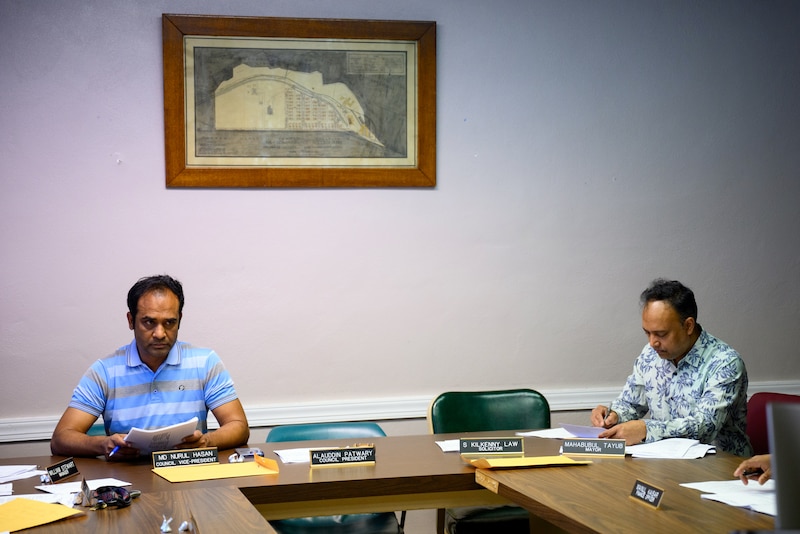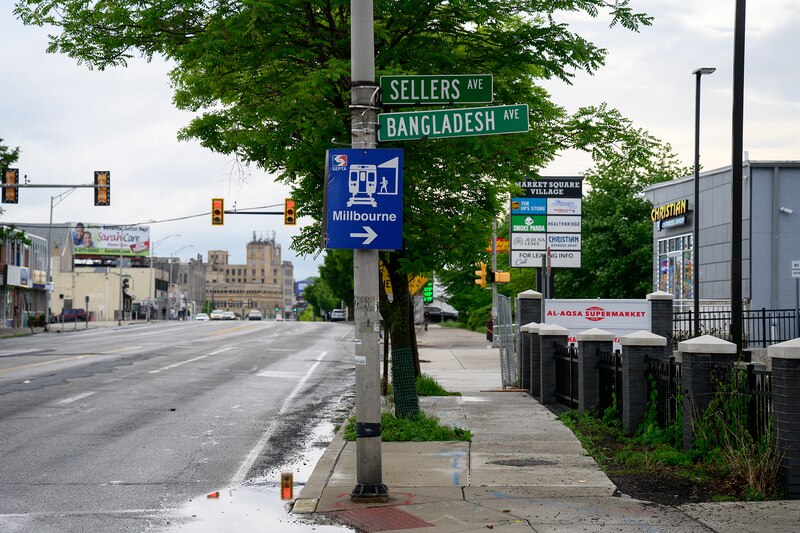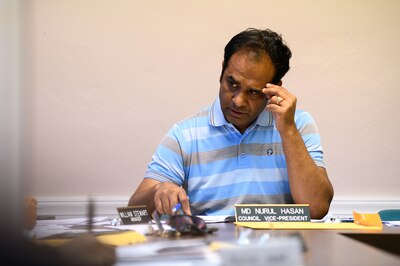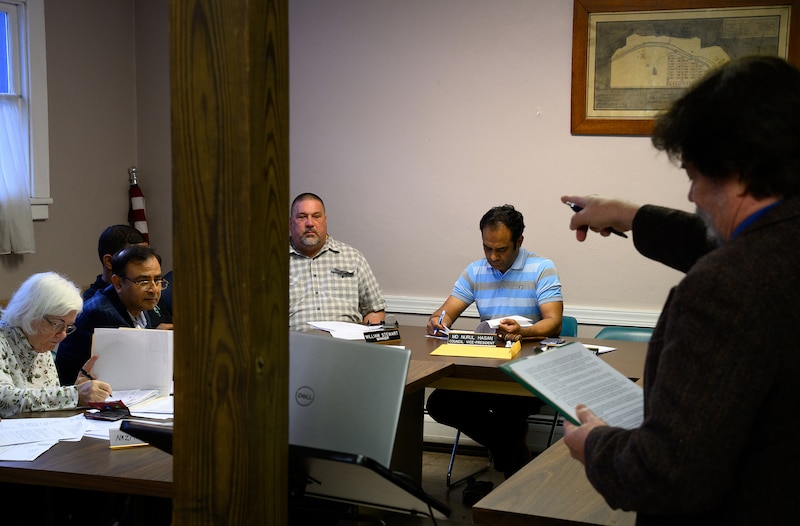Votebeat is a nonprofit news organization reporting on voting access and election administration across the U.S. Sign up for Votebeat Pennsylvania‘s free newsletter here.
In October 2021, shortly before Election Day, Mahabubul Tayub was reviewing the voter rolls for the tiny Philadelphia suburb of Millbourne, where he was on the ballot as a candidate for mayor. Something didn’t seem right.
Dozens of new voters had been registered in recent weeks, he noticed, including some people he knew — people who didn’t live in Millbourne.
Tayub won the mayoral election that November, but it would take years for authorities to fully unravel what was behind the odd registrations he discovered: a brazen attempt at election fraud.
Just last month, his opponent in the 2021 race, Md Nurul Hasan, pleaded guilty in federal court to 33 felony charges in a failed scheme to steal the election by illegally registering dozens of nonresidents as Millbourne voters, then casting mail ballots on their behalf. Two associates also pleaded guilty to multiple charges, including fraudulent voter registration.
The case serves as a reality check amid a raging national debate over election security and the threat of voter fraud, especially in swing states like Pennsylvania. It’s proof, on one hand, that despite the many safeguards in place, voter fraud can happen at the local level, with lasting consequences for the community. On the other hand, it also helps illustrate how difficult it would be to orchestrate such fraud on a larger scale without detection.
“It seems to be in the local races this pops up the most, where there is a smaller turnout and there is possibly a direct connection between the person committing the bad act and the person who is going to benefit from the bad act,” said Jim Allen, the Delaware County elections director.
It’s in these small jurisdictions, he said, that “the temptation is highest and the risk-reward is highest.”

Two immigrants became friends, then competitors
Millbourne is a tiny borough at the eastern edge of Delaware County, bordering Philadelphia. It covers less than 50 acres — not even a tenth of a square mile — and has roughly 1,200 residents.
The land was originally the homestead of the Sellers family, immigrants from Derbyshire, England. In the mid 1700s, John Sellers opened Millbourne Mills, a flour mill that drew its name from nearby Mill Creek, now Cobb’s Creek — the dividing line between Delaware County and Philadelphia.
As small as it is, the borough has seen huge demographic changes in recent decades. In 1980, it was more than 90% white, according to the U.S. Census Bureau, but by 2020, it was majority Asian. That was driven by immigration from South Asia, including India and Bangladesh.
Now, Market Street, the main thoroughfare through Millbourne, is dotted with South Asian grocery stores and boutiques selling Indian, Bangladeshi, and Pakistani clothing. In 2023, Sellers Avenue — a short, mostly residential street named after the founding family — was given a second name: Bangladesh Avenue, a change that the local Bangladeshi community celebrated as a testament to their growing economic and political power.

Tayub, 47, grew up in Chittagong, a port city in southeast Bangladesh. He graduated from university there with a degree in economics, and moved to Philadelphia, then Millbourne in the early 2000s. Hasan, 48, is also from Chittagong, and Tayub said the two had become friendly when he and Hasan lived in the same Philadelphia building.
“All the friends [who were] the same age, all the people from Bangladesh” socialized together, Tayub recalled.
Tayub also got to know former Millbourne Mayor Tom Kramer, a Democrat who later encouraged him to run for the five-member borough council. Tayub and Hasan both launched bids as Democrats and won in the 2015 municipal election, Tayub said. (Both Tayub and Hasan are U.S. citizens.)
In the spring of 2021, Kramer decided against running for another term as mayor. Tayub entered the race, with Kramer’s support. Hasan jumped in, too.
The town’s voters skewed heavily Democratic, which meant whoever won the party primary was likely to coast to victory in the fall. And whether it was Hasan or Tayub, the winner was poised to become the first Bangladesh-born mayor of a U.S. town, a prospect that received media attention in Bangladesh.

Tayub said he wasn’t worried about the competition. “I have faith people know me,” he said.
Tayub won the primary by 18 votes out of 258 cast. But Hasan launched a write-in campaign for the November general election with the support of two other council members: Md Munsur Ali and Md Rafikul Islam, who lost his primary bid for reelection to the council. (Md is an abbreviation for Muhammad, and a common prefix for Bangladeshi names.)
How the plot unfolded
According to the federal indictment that laid out the men’s attempt to steal the election, the three conspired to obtain personal information from non-Millbourne residents — mainly friends of Hasan’s and Ali’s. Hasan then registered them to vote in Millbourne using the Department of State’s website, the indictment said — in some cases updating existing registrations by changing them to Millbourne addresses — and requested mail-in ballots on their behalf.

The indictment said Hasan and Ali told the residents of nearby communities, including Upper Darby and Philadelphia, that they would not get in trouble, so long as they “did not vote in another election in November 2021.”
The indictment described an effort to “cover up the fact that defendant HASAN was requesting mail-in ballots for dozens of different people,” in which Hasan alternated email addresses when registering the voters, as well as the addresses, and requested that the mail ballots be sent to various locations.
According to the indictment, after receiving the ballots, Hasan and the others wrote in Hasan’s name for mayor and cast the ballots. In all, the indictment says, Hasan and his co-conspirators fraudulently registered nearly three dozen people.

The indictment doesn’t identify the voters who were registered improperly, but one of the people whom Hasan registered confirmed his involvement and agreed to speak with Votebeat and Spotlight PA on condition of anonymity, out of concern that their involvement in the scheme could jeopardize their current employment.
The voter confirmed giving Hasan their driver’s license and allowing Hasan to proceed with the Millbourne registration and request a mail ballot for them.
“I trusted him and thought if I only give one vote, it’s not a problem,” said the person. “He made us fools.”
Suspicion ahead of Election Day: ‘I know these people.’
The votes hadn’t even been counted when Millbourne residents began to catch on to the scheme. According to the indictment, the borough added 29 voters between the primary and the November election. Given that Millbourne had fewer than 600 voters, it was a noticeable jump.
After Tayub grew suspicious of the new voter registrations, he brought his concerns to Kramer, the departing mayor, though neither man remembers exactly when.
“I know these people, they never live [in] Millbourne,” Tayub recalled thinking when he saw some newly registered names. “They live [in] Upper Darby.” Tayub’s attorney filed a complaint with the county elections office on Oct. 28, 2021. Tayub and Kramer said they also reported the matter to law enforcement around the time of the election. The district attorney’s office did not respond to a question about when and how they became aware of the matter.
Allen, the county elections director, said in an email that Hasan himself had questioned some voter registrations months earlier, in April, and his office had referred that matter to the district attorney. Allen wrote that in the months and years after Tayub’s complaints, “we received and responded to periodic inquiries from investigators.”
But Tayub and others in Millbourne said they grew frustrated because although the county was taking steps to look into the situation, for nearly a year afterward, they didn’t observe much progress.
“I couldn’t take it,” Tayub said during a recent interview with Votebeat and Spotlight PA.
Tayub, Kramer, and the borough’s secretary, Nancy Baulis, all met with an assistant district attorney before the May 2022 primary to discuss the status of the case, and Baulis and Kramer followed up with emails to county officials, including the district attorney, a few months later expressing frustration about the apparent lack of movement.

Kramer shared those emails with Votebeat and Spotlight PA. In his, he wrote that the assistant district attorney at the meeting had said that “this particular situation was very problematic politically,” and would generate media interest.
In an interview, Kramer said after sending that email, he reached out to the FBI. He said the investigation seemed to pick up after that.
The federal indictment came in February 2025.
The county separately charged Hasan with unlawful voting and related charges in March, and the case is pending. Because of that, District Attorney Jack Stollsteimer said he could not discuss the matter, but said in an email that it is “inaccurate” to say that the county did not move quickly on the case before the FBI’s involvement.
Neither the district attorney’s office nor the assistant district attorney Kramer mentioned in his email responded to a request for comment on what Kramer said he was told at the May 2022 meeting.
The Pennsylvania Department of State said it “first became aware of the fraud allegations when it was contacted by federal law enforcement.”
“I don’t have any comment beyond stating the obvious, that there has been a prosecution,” Allen, the county election director, said. “It was a very difficult matter to investigate because you can’t make assumptions [based on] ‘Well, this house looks empty.’ Well, was it empty last fall? How do you know it’s empty? Did someone move out?”
Asked after an April borough council meeting if he had any explanation or comment, Hasan declined. “I don’t want to say anything now,” Hasan said.
Hasan’s attorney, Michael Dugan, said his client had no comment in response to a list of questions about the scheme. Islam, Ali, and their respective attorneys did not respond to emails with detailed questions for this story.

The reality of election fraud vs. false claims
Cases like Millbourne’s muddy the intensifying national debate over election fraud: how widespread it is, what to do about it, and, more fundamentally, whether our election system can be trusted.
In recent years, an ecosystem of conspiracy theories about election manipulation has flourished online. Justin Grimmer, a political scientist at Stanford University, has researched the kind of broad claims of systematic election fraud that President Donald Trump and his allies made after the 2020 election to explain his loss, and said he has found no evidence of any such conspiracy.
But Grimmer’s research has turned up real instances of fraud, and they typically look like what happened in Millbourne — a local race, involving a relatively small number of votes.
“I think it gives some insight into why it would be very hard to do this in a broad national way,” he said. “This sort of fraud will leave lots of markers that people will end up discovering.”
The kind of “marker” Grimmer is referencing is the evidence Tayub was able to cite: actual names and addresses for the people who were drawn into the scheme.
Scaling a scheme like the one in Millbourne to one that involves enough votes to swing a statewide or national election would be hard, Grimmer said, because it would involve so many people.
The perpetrators here had access to driver’s license numbers, which according to the indictment they got directly from the voters. Allen, the county election director, said he was unaware of any other fraud case where voters gave out their personal information like this.
Stephanie Singer, a former Philadelphia city commissioner who was in office in 2016 when a ballot box stuffing scheme orchestrated by a former congressman was happening, has developed an algorithm that looks for anomalies in election results in the hopes of catching attempted fraud. Georgia is currently using the program to monitor its elections.
“Part of the job, not just of the board of elections, but of us as a democratic populace, is to guard against that,” she said. “The people who win the elections have access to money and power, and that means it’s really tempting to cheat.”
These attempts to cheat, even if they are initially successful at changing the results, are frequently caught, and election officials uphold those cases as examples of the safeguards working. Even so, the very fact that they occur can help destroy trust in elections.
Incidents like those in Millbourne and in a 2018 North Carolina congressional race that required a new election can serve as a “proof of concept” for those already suspicious that election fraud is happening, Grimmer said.
He recalled a county elections meeting in Oregon where he was trying to counter points made by a speaker who believed there was a broad conspiracy to steal elections, and cited a local incident from California as an example.
“In that setting, I can explain that it’s very different than the kind of conspiracy he’s alleging,” he said. “But if someone’s suspicious, all of a sudden it does reveal that it is possible to do this at least on a small scale.”
“If I’m not sufficiently persuasive in that meeting that it’s hard to scale this up,” he added, “you could see how this can further undermine trust” in election administration.
In Millbourne, the story isn’t over
Nearly four years after the election fraud, and a month after the guilty pleas, a tense mood still hung over Millbourne’s five-member borough council.
Two members resigned recently for reasons unrelated to the fraud case, which until recently left only three members, including Hasan and Ali. Despite their convictions, the men refused to immediately resign, and weren’t legally required to do so. Sentencing is scheduled for June.
By staying in office, Hasan and Ali allowed the borough to keep conducting council business. Without them, the council wouldn’t have had enough members.
But recent council meetings were marked by fraught exchanges over the matter.

The borough council building is a tight space. A sliding partition and support pillar split the room between attendees and the U-shaped arrangement of folding tables where council members sit.
At an April 15 meeting, Kramer, the former mayor, stepped in front of the pillar when it was his turn to offer public comment.
“I’d like to address our felonious council people,” Kramer said, facing Hasan and Ali. “I wanted to ask if either one of you had any intention of resigning.”
The eyes of the other borough officials shifted to Hasan to see how he would respond.
Hasan, wearing a purple button-down shirt and gray jacket, looked uncomfortable as he answered, shifting his feet and looking around the room or down at his papers.
“Actually the court has a restriction,” he said. “I don’t want to say anything.”
But on May 13, borough officials confirmed that Hasan had formally submitted his resignation, though the council has yet to accept it.
As of Tuesday, Ali had not resigned.
Getting a public official out of elected office — outside of defeating them at the ballot box — is not simple, even if the official has pleaded guilty to a felony.
“It’s not just automatic,” James Gallagher, the borough’s solicitor, explained at an April meeting. He said Hasan and Ali’s resignations would be “in the best interest of the borough.”
The state Legislature can impeach local elected officials, but rarely uses that power. The other option is a quo warranto action, a legal action challenging a public official’s right to hold office, typically brought by the district attorney or state attorney general.
Chris Cosfol, a resident of Millbourne, said he wants the district attorney’s office to bring such an action. The ordeal has been “embarrassing” for the borough, he said, and he thinks the members should have automatically been removed from office once they entered a guilty plea.
Neither the district attorney’s office nor the attorney general has yet taken such action.
Carter Walker is a reporter for Votebeat in partnership with Spotlight PA. Contact Carter at cwalker@votebeat.org.

